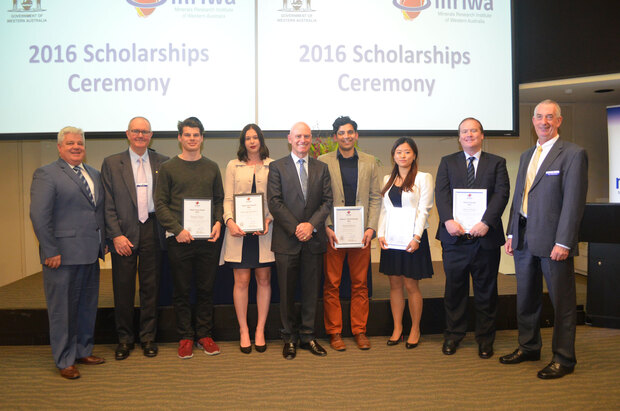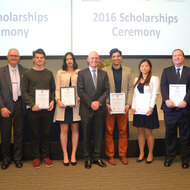MRIWA fosters new wave of academic talent
| Date: | Friday, 08 July 2016 |
|---|
Scholarships and awards worth a total of nearly $330,000 were presented last night to a new wave of academic talent enriching Western Australia’s resources industry.
Mines and Petroleum Minister Sean L’Estrange presented eight postgraduate and PhD students with prizes awarded by the Minerals Research Institute of Western Australia (MRIWA).
"The institute's work is becoming increasingly important to the future of the resources sector as exploration targets become deeper, more difficult to identify and test, and data processing becomes more complex," Mr L’Estrange said.
"That is why the State Government, through MRIWA, is investing in emerging new scientists and researchers through a post-graduate scholarship program that focuses on students undertaking critical projects."
Mr L’Estrange said that the $6 million in additional funding to MRIWA announced in the State Budget was fostering Western Australia’s next generation of engineers, geologists and other scientists.
Since June 2014, the institute has granted 24 Odwyn Jones Honours Awards, two Directors PhD scholarships, and seven PhD scholarships, with a total value of $835,000.
By 2017 that figure will have reached almost $1.3 million
The prestigious Odwyn Jones awards program honours the contribution of Emeritus Professor Odwyn Jones, a strong advocate for mining education programs and a former chair of the institute’s Minerals Research Advisory Committee.
The Directors PhD scholarships, which are substantially funded by the directors’ donation of their board sitting fees, encourage post-graduate research in areas MRIWA’s board considers critical to the long term success of Western Australia’s minerals industry.
Since 2014, the institute has committed $8.1 million to minerals research, mainly through funding research institutions in Western Australia.
The winners
Winner of the best thesis from the 2015 Odwyn Jones program:
- Christopher Gilbertson (Murdoch University) for his thesis on the dissolution characteristics of chloritic-copper ore in cyanide and sulphuric acid.
- Winner of the 2016 Directors PhD award: Ahmad Saleem for his project entitled Quantifying the role of exploration upside in mineral project evaluations: the missing link in project value determination? Saleem graduated with a joint degree from Carlton University in Canada and Monash University and will be supervised by Professors Mark Jessell and Allan Trench at the University of Western Australia.
- Second PhD award winner: Eun Joo Choi for her project Alkaline magmatism as a probe into the architecture of the Archean lithospheric mantle, Yilgarn Craton, Western Australia. Eun Joo graduated from Korea University and will be supervised by Professor Marco Fiorentini from the Centre for Exploration Targeting at the University of Western Australia.
- Third PhD award winner: Rashid Vaneghi for his project Progressive damage mechanisms of rocks subjected to cyclic loading. Rashid graduated from the University of Tehran and will be supervised by Professor Benham Ferdosi at Curtin University.
- Fourth PhD award winner: Harry Watts for his project Developing a more benign way to extract rare earths from monazite ore using a sequence of weak organic acids at a moderate pH and room temperature and ore recirculation. Harry graduated from Curtin University and is being supervised by Professor Yee-Kwong Leong at the University of Western Australia.
Odwyn Jones Awards:
- Wei Han from Curtin University, supervised by Professor Carla Boehl. His project is Haulage simulation for autonomous haulage trucks.
- Kaarina Recklies from Murdoch University, supervised by Professor Aleks Nikoloski. Her project is The effects of clays, dispersants and collectors on the flotation of Au-Cu ores.
- Thomas Pilote from The University of Western Australia, supervised by ARC Future Fellow, Dr Anthony Kemp. His project is Geochemical and petrological controls on rare earth element mineralization, and phase mobility in the Mukinbudin granitic pegmatites and their associated regolith profiles.
Fact file
MRIWA’s portfolio includes these important national projects:
- $2.58 million for the Distal Footprints of Giant Ore Systems: Capricorn WA Case Study. This is a $16 million dollar project, with co-contributions from the Science Industry Endowment Fund, the Geological Survey of WA, Curtin University, the University of Western Australia and nine mining companies.The project is enabling easier identification of the mineralogical and geochemical signatures of major ore bodies to help discover the mines of tomorrow.
- $600,000 for the Cooperative Research Centre for Optimising Resource Extraction, an organisation that promotes technology development and implementation.
- $1.1 million to help predict dangerous rock bursts during mining operations, a project being led by the Australian Centre for Geomechanics at the University of Western Australia.
In the past two years, MRIWA has engaged in research initiatives such as the AMIRA Uncover Roadmap and the In-Situ Recovery Roadmap being prepared by CSIRO and Curtin and Murdoch Universities.
MRIWA is a founding member of the Cooperative Research Centre for Optimising Resource Extraction, an organisation created in 2010 to find solutions to the challenges of sustaining mining beyond periods of high commodity prices.


